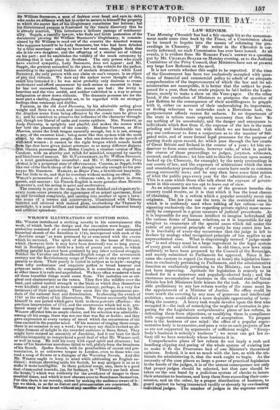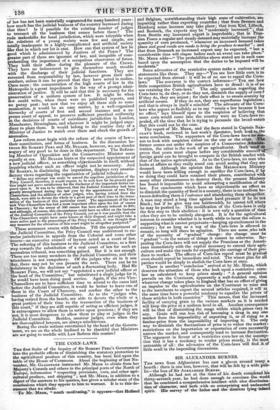TOPICS OF THE DAY .• earl •
LAW REFORM.
THE Morning Chronicle has bad a fair enough'hit at the announce- ment made some time back by the Times, of a Comtnission "about to be issued to inquire into the means of reforining the Pro- ceedings in Chancery. If the writer in the Chronicle is cosi- rectly informed, no such Commission has ever been issued. At all events; it is evident frcim Sir ROBERT PEEtiS answer to a question put by Mr. CHARLES BULLER on Monday evening, act to the Judicial Comniittee of the' Privy Couucil, that Ministers have not at preset any large Law Reforms on the anvil.
It is not certain whether this ought to be regretted. If the time of the Government has been too' exclusively occupied with ques. tions of financial and 'commercial policy to admit of an adequate comprehension of the improvements of which the law and its" ad- ministration are susceptible, it is better that the subject be Post- poned for a year, than that crude projects be laid before the Legit,. lature," merely to make a show on the Vote-ratier. On the other hand, if the resolution of Minister's to postpone the question of Law Reform be the consequence of their unwillingness to grapple with it, either 'on. account of their 'undervaluing its importance, or feeling reluctant to undertake such a Herculean task, the postponement affords reason for sadness. Li no department of the state is reform more urgently necessary than the law! 'Bo say nothing of its uncertainty, and the danger and annoyance to individuals 'which flow from it, the expense of the law is the'most grinding and intolerable 'tax with which we are burdened. Let any one endeavour to form a conjecture as to the number of liti gated Suits, and Of mere formal legal processes for the purpose of putting deeds upon record, &c. which pass through the law courts of Great Britain and Ireland in the course of a year ; let Min en- deavour to form some estimate, however rude, of what is paid in the course of those proceedings to judges, jurymen, witnesses, counsel, and solicitors ; let himadd to this the interest upon money locked up (in Chancery, for example) by 'the tardy proceedings in our courts of law, and the expenses of arbitrations which. the slow and unsatisfactory pro&edings of our courts have made so common among mercantile .men; and he may then have some faint notion of what the public pays every year for the administration of law. This is a sum which those who talk about the expense of govern- ment in this country are too apt to leave out of view. As an adequate law reform is one of the greatest benefits the country could receive, so it is that which it has the least chance of obtaining. It is a reform which a popular assembly never can originate, The law (we use the term in the restricted sense in which it is uniformly used when talking of law reform—as de- signating exclusively the law regarding private rights) must neces- sarily be composed in a great measure of judicial' precedents. As it is impossible for any huruan intellect to imagine, beforehand. all the various forms of human relations, so it is impossible for any lawgiver to enumerate all the special cases which fall under, the rubric of any general principle of equity he may enact into law. It is inevitably of every-day occurrence that the judge is left to declare by analogy what recognized principle of law applies to an unprecedented case, What is dispraisingly termed "judge-niacle law" is and always must be a large ingredient in the legal system of every great and civilized nation. In old times, new laws seem nnifortuly to have been prepared by the Council of the Sovereign, and merely submitted to Parliament for approvaL Since it be- came the custom to regard (in, theory at leaat) the legislative func- tion as exclusively pertaining to Parliament, and the administrative function as exclusively pertaining to the Ministry, Our laws hav,e not been improving. Aptitude for legislation is scarcely to be looked for in a numerous and popularly-elected body ; and the enormous accumulation of business in the colossal state of Great Britain has left Ministers little leisure for the task. An inclispena- able preliminary to any law reform worthy of the name must be the appointment of a Minister of Justice. No office could be more worth the coveting, by any man of generous and intellectual ambition ; none could afford a more desirable opportunity of bene- fiting the country. A heavy task would devolve upon the first who occupied it—the task of remedying the neglect of centuries in pre- paring for the Legislature comprehensive plans of law reform, in defending them from objections, or modifying them in compliance with suggested amendments worthy of acceptation. To prepare laws is the business of one mind : the office of a popular repre- sentative body is to examine, and pass a veto on such projects qflaw as are not supported by arguments of sufficient weight. "Every- body's business is nobody's business " : we never can get law re- form till we have somebody whose business it is.
Comprehensive plans of law reform do not imply a rash and
headlong clipping and paring 'of the whole system of existing law to make it fit the Procrustes bed of one Minister's theoretical opinions. Indeed, it is not so much with the law, as with the tri- bunals for administering it, that the work ought to begin. As the necessity of the case places so large a power of practical legislation in the hands of the judges, it is of the utmost consequence not only that proper judges should be selected, but that care should be taken on the one hand by a judicious system of checks to insure their attention to business, and keep them from exceeding their com- mission, and on the other, by a proper distribution of business, to guard against its being transacted tardily or slovenly by overloading individualjudges. The number of judges in the supreme courts of law has not been materially augmented for many hundred years : how much has the judicial business of the country increased during that time ! Is it possible for the existing number of judges to transact all the business that comes before them ? The rude makeshifts for local jurisdiction, which were tolerable when the relations of a young society were few and simple, are totally inadequate in a highly-complicated and artificial society like that in which our lot is cast. How can that system of law be good which is administered by Justices of the Peace ? The greater part of them are ignorant of law, and incapable of com- prehending the importance of a scrupulous observance of forms. They hold their office during the pleasure of the Crown. They have no inducement to Five themselves much trouble with the discharge of their judicial functions. They are screened from responsibility by law, however gross their mis- conduct, unless it can be proved that they have acted in malice. Once more : the concentration of the high courts of law in the Metropolis is a great impediment in the way of a prompt admi- nistration of justice. It will be said that this is necessary for the preservation of a uniform system of law. It might be when few could write, when there were no published reports, and no penny post : but now that we enjoy all these aids to com- munication, it would be an easy matter, by a well-organized hierarchy of courts of first and second instance and a su- preme court of appeal, to preserve sufficient practical uniformity in the decisions of courts of coordinate jurisdiction in London, Manchester, Birmingham, and wherever it might be judged expe- dient to plant them. It would belong to the routine duty of a Minister of Justice to watch over them and check the growth of anomalies.
Law reform must begin with the reform of the courts of law— their constitution, and forms of business. In the discussion be- tween Sir ROBERT PEEL and Mr. BULLER, however, we see slender augury of any good to be done in this department. The Reform- ing Member of Opposition and the Conservative Minister seem equally at sea. Mr. BULLER hints at the suspected appointment of a new judicial officer, as something objectionable in itself, without inquiring whether such an officer might not be necessary. And Sir ROBERT, in disclaiming the imputation, displays very unsatis- factory views regarding the organization of judicial tribunals— "Before any attempt was made to amend the appellate jurisdiction of the Privy Council, therefore, it would require to be seen how far its present posi- tion might not prove satisfactory for the discharge of the important duties im- posed upon it. It was to he observed, that the Judicial Committee had been greatly strengthened during the last year by the appointment of two Vice- Chancellors, and the addition of other judges, who, having retired from the bench, were able to devote the whole or a great part of their time to the trans- action of the business of this particular court. The appointment of the two new Vice-Chancellors has had a most important effect upon the list of causes In Chancery ; for the arrear of 500 causes has been already reduced to 200; and although, of course, this circumstance could have no effect on the business of the Judicial Committee of the Privy Council, yet as it was possible that the Vice-Chancellors might have some leisure at their disposal, and might take a more active part in the proceedings of the Privy Council, it was thought that any measure for the alteration of this court might be altogether postponed."
These sentences swarm with fallacies. Till the appointment of 'the Judicial Committee, the Privy Council was understood to ex- ercise jurisdiction in appeals from the Colonial and some other courts—an executive council of laymen acted as a court of law. The referring of this business to the Judicial Committee, as a first step towards the substitution of a real court of law for such an anomalous tribunal, was something gained. But it is not enough. There are too many members in the Judicial Committee, and their "attendance is not compulsory. Of the judges who sit in it one 74ay, there may not be one present the next. There can be no 16onsistency in the decisions of such a fluctuating body. Had Sir ellonsirr PEEL, we will not say "appointed a new judicial officer at the head of the Committee," but substituted a single judge for it, be would have been doing good service. Again, if the two Vice- -Chancellors are to have sufficient time to attend to the cases laid before the Judicial Committee, it would be better to leave one of them in the Court of Chancery, and confine the other to the business of the Judicial Committee. As to the "judges who, having retired from the bench, are able to devote the whole or a great portion of their time to the transaction of the business of this court," if they are still capable of acting as efficient judges, it is extravagance to allow them to retire upon pensions ; if they are not, it is most dangerous to allow them to play at judges in the Judicial Committee. Besides, amateur judges, even when they are thoroughbred lawyers, are always mischievous.
Seeing the crude notions entertained by the head of the Govern- ment, we are on the whole inclined to be thankful that Ministers are not going to meddle with Law Reform this session



























 Previous page
Previous page